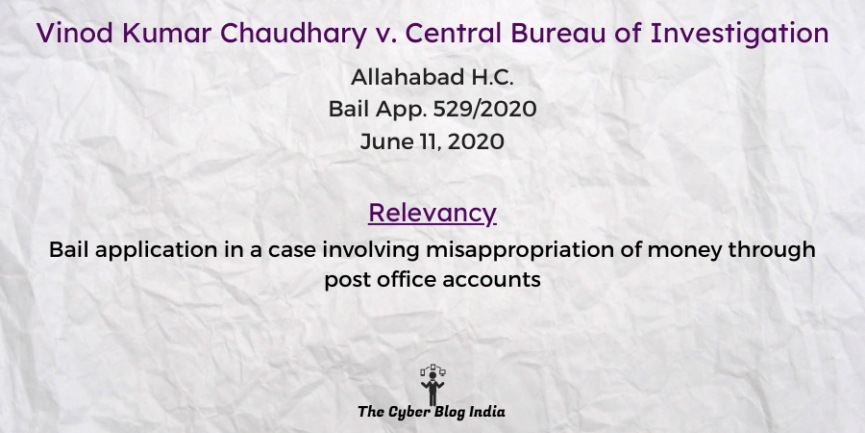Vinod Kumar Chaudhary v. Central Bureau of Investigation

Vinod Kumar Chaudhary v. Central Bureau of Investigation
In the High Court of Allahabad
Bail App. 529/2020
Before Justice Vikas Kunvar Srivastav
Decided on June 11, 2020
Relevancy of the case: Bail application in a case involving misappropriation of money through post office accounts
Statutes and Provisions Involved
- The Information Technology Act, 2000 (Section 66)
- The Indian Penal Code, 1860 (Section 120B, 201, 204, 409, 420, 467, 468, 471, 477A)
- The Prevention of Corruption Act, 1988 (Section 13(2), 13(1)(c), 13(1)(d))
Relevant Facts of the Case
- The initial complaints were about misappropriation and defrauding of 27 savings accounts at a Jhansi Post Office.
- The applicant, a Postal Assistant, and the other co-accused had committed a criminal breach of trust by obtaining illegal gains from the state.
- They modified the computer data and later deleted it, along with other evidence such as electronic documents.
- The accused had deleted the 21 accounts after withdrawing the amount. They later added back the accounts to the system.
- The accused had also forged the witnesses on the withdrawal slips, which they used to withdraw money fraudulently.
Prominent Arguments by the Advocates
- The applicant’s counsel submits that the preliminary inquiry for two private complaints was handled by the then Senior Superintendent, who was named a perpetrator in those complaints.
- Hence, it is contended that the Senior Superintendent has fabricated facts towards the complainant during his five years of inquiry.
- The counsel argues that the prosecution neither establishes the applicant’s role in the offence nor shows the benefits gained by him from the alleged monetary fraud. Hence, there is no prima facie case against the applicant.
- The learned ASG argues that the applicant had a duty to verify the people seeking withdrawals, which he failed to do when he let withdrawals happen on forged documents.
Opinion of the Bench
- The court took into account that the other co-accused in the case have been granted bail earlier.
- They also considered a delay in the trial, although the charge sheet had been filed.
Final Decision
- The bail was granted subject to certain conditions.
This case summary has been prepared by Loreal Sahay, an undergraduate student at University School of Law and Legal Studies, GGSIPU, during her internship with The Cyber Blog India in January/February 2021.
